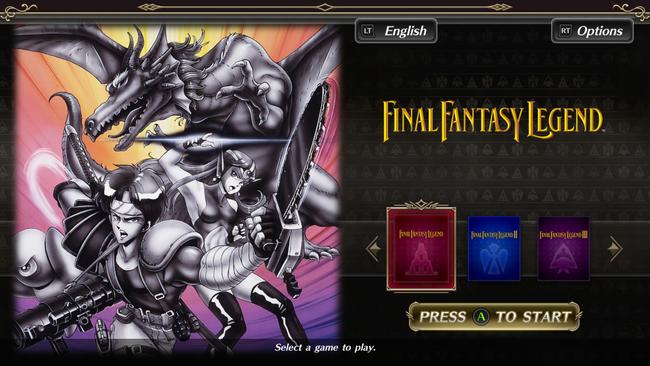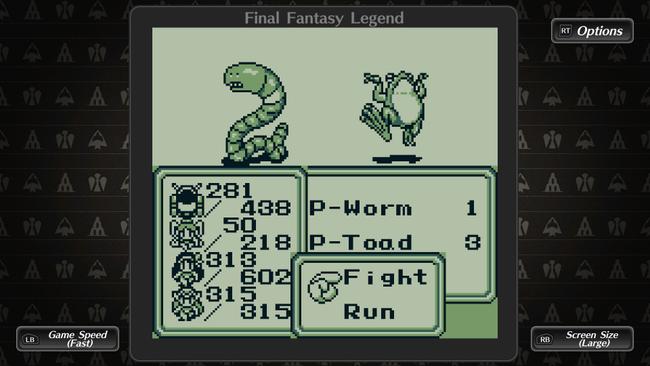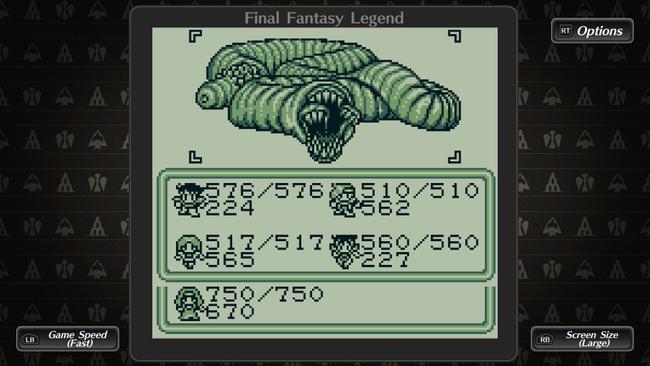Square Enix ported the Final Fantasy Legend Game Boy games to PC & Switch, and I appreciate that
In what is nigh assuredly Square Enix's lowest profile release of 2021, Collection of SaGa Final Fantasy Legend is now available for Steam and mobile devices, having also released for Nintendo Switch late last year. While this isn't a formal review, really, I just wanted to take some words to say: Thanks Square, I appreciate it.
For those not aware, Collection of SaGa is a trilogy of three Game Boy titles that were originally released between 1989-1991: The Final Fantasy Legend, Final Fantasy Legend II, and Final Fantasy Legend III. In Japan, these games go by a different name, as they are the first three entries in Square's still-ongoing SaGa series. And yeah, they are old, more than 30 years so.
In a world where digital storefronts full of classic games are slowly closing down and publishers more often opting for novelty mini-consoles or subscription services, I appreciate Square Enix's current commitment to bring back classic games to modern consoles as standalone products, especially on a platform like Steam, which shouldn't have to worry as much about backward compatibility for years (or hopefully decades) to come.

Sure, not all of these re-releases are perfectly done, at least initially. However, having these classics once again available certainly beats having them languishing on platforms a few generations out-dated, and Square has put forth some admirable efforts to address the places where they falter. This year alone we also saw great remasters of SaGa Frontier Remastered & Legend of Mana, and of course Chrono Cross rumors have also been floating around too.
Collection of SaGa is not really a remaster, instead being mostly a straight port with not many changes made to the original Game Boy releases. However, there is one key addition - a high-speed 'turbo' mode where the game will run at a much higher speed, both in and out of battle. These sorts of additions are relatively common in re-releases such as this for classic RPGs, but I'm very glad nonetheless that the option is there. It's almost hard to imagine playing the game *without* a turbo mode these days. It's also worth mentioning that the turbo mode does *not* speed up the music, which some other games do, and so I also appreciate that.
I'm not going to mince words. Unless you are revisiting for nostalgia purposes, or you are an old soul (like me) who habitually likes to explore some of the oldest entries in the genre, going back in time to play these games can be rough, unless you are in the right mindset. GB graphics aside, the storyline is minimal, the text is terse, menus are cumbersome, and you'll be spending a lot of time not sure where to go or what to do unless you are referencing a walkthrough. Random battles and restrictive inventory limits aren't found in many modern RPGs, but you bet you'll run into those here.

The Final Fantasy Legend is probably the trickiest title to get to, being the oldest of the three games with the most difficult challenge. Especially if you are relatively unfamiliar with SaGa series elements, jumping straight into the first game might be a struggle, especially early on. You'll be asked to make human, mutant, or monster characters without a clear explanation about what the differences are, and the game will rarely ever be specific in telling you where to go. You'll also be strapped for cash for much of the early game. That said it definitely has some cool systems in place that will make appearances in future games in the SaGa series, and it's fun to see how the series started - if you can acquiesce to its unrefined nature.
Final Fantasy Legend II improves upon the first in nearly every way, adding a more involved storyline, better game balance, better art, and some cool game mechanics. It's still weird as hell, but weird is cool, and it'll take some experimenting to learn exactly how the game's leveling works. Final Fantasy Legend II is where the SaGa series hits its first stride, coming together more cohesively than the more prototypical entry in FFL1. Besides other SaGa games, some of the mechanics here aren't easily found in other RPGs even today, so a 30-year-old game can feel fresh and different despite its age. Much like the original though, you may still find yourself wandering a bit to learn how to proceed through the game, as the game will not hold your hand. Alternatively, you can always follow a guide or walkthrough.
Final Fantasy Legend III is easily the game that is easiest for newcomers to get into. It's also probably the SaGa game that feels the least like a SaGa game, for better or worse. It uses a more traditional non-SaGa leveling system, and it's relatively easy to overpower your team to the point most enemies won't stand a chance. It has the most defined characters and story relative to the entries before it, and it also has a great soundtrack considering it's a Game Boy game (done by Ryuji Sasai who also worked on Final Fantasy Mystic Quest).
There's only one issue with the PC port I would consider significant, but not quite a deal-breaker. It seems that no matter how I reset the game, either through the in-game function or through Steam itself, the game's RNG 'seed' is always initialized in the same way, meaning the random battles & results upon loads are always the same & predictable.
This can be either advantageous or disadvantageous, depending on what you may be trying to do. For example, in FFL, I realized in the ocean world that my mutant in my first slot would always gain +5 Agility on the second battle after a load, so I exploited this to maximize his Agility stat. However, if you are trying to get a certain random drop (either item or meat, or maybe a certain stat up) from a boss battle for whatever reason, it's more difficult to reset to do this, since the RNG is seeded the same way every time.

Another issue with the re-release is that there are no manuals included. Especially in the '90s and earlier, many game tutorials and even narrative bits were sequestered away from the game itself and placed into a manual that was included in the box. Especially for a series as mechanically weird and relatively unexplained as SaGa, including a digital manual for these games would have been a perfect addition for the re-release. Luckily, you can find similar details online with a simple Google search, but the exclusion of a digital manual is disappointing.
Don't get me wrong, I like these three SaGa games and I'm very glad they are now playable on a modern console. SaGa games may always be a bit of an acquired taste - the 30-year-old entries especially so. A $20 price point, with some occasional sales, is reasonable considering that finding the original cartridges second-hand will cost you far more for the three games.
Minor blemishes aside, Collection of SaGa is a solid, straightforward, and mostly no-frills re-release of some decades-old RPGs. With the SaGa series still alive and well 30 years after this trio originally released, we can all look forward to a new SaGa game hopefully getting announced in 2022.